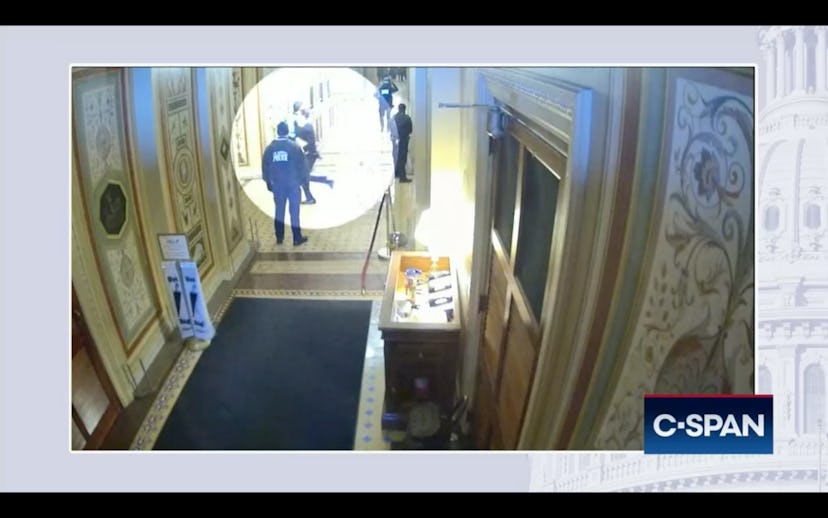The last Jan. 6 hearing of the summer was a masterclass in viral humiliation
As I’ve said from the start, the Jan. 6 congressional committee investigating the lead up, events of, and immediate aftermath of former President Donald Trump’s attempted coup has two parallel goals: While the panel is fundamentally a fact-finding body, compiling evidence to, ideally, inform any potential criminal indictments to come, their work — especially the recent string of televised hearings — is also painstakingly designed to establish a compelling, easily understood narrative for the public. The aim is less to bombard viewers with shocking facts and smoking-gun revelations (although there have been a few of those, too) as it is to give a holistic sense of cohesion to a complex series of events we all watched, in bits and pieces, with our own eyes.
In what was initially to be the committee’s final public hearing (until co-chair Liz Cheney announced a new round of hearings, scheduled for sometime this September, during the opening moments of last night’s broadcast), investigators faced a unique challenge. With the broad goal of showcasing what Trump did — and more importantly didn’t — do during the insurrection itself, the committee’s focus necessarily expanded outward to highlight what was occurring elsewhere while the former president sat watching TV in his private dining room. The conceit, essentially, was “things were so bad at the Capitol that even the president’s own allies and enablers were scared for their lives — all while he himself did nothing to help them.” And to prove that point, the committee members simply let the president’s own allies’ words and actions do the heavy lifting for them.
In a series of conspicuously made-for-memeing clips, committee members systematically highlighted how seditious enablers like Missouri Sen. Josh Hawley helped pump the crowd of violent insurrectionists into a frenzy, only to flee in private terror once things got really bad.
So too with Alabama Sen. Tommy Tuberville, another of the former president’s most stalwart sedition supporters, who literally had to hang up on Trump’s effort to get him to delay Joe Biden’s election win certification because the riot Trump had instigated was getting too close for comfort.
House Minority Leader Kevin McCarthy (R-Calif.) got his moment in the sun, as well, with witnesses testifying that he was scared for his life during the riot. It follows previous reporting that he’d privately blamed Trump for the violence, even as he publicly backed the former president’s ego-driven consolidation of power.
The overall thrust here is clear: Trump’s chief enablers and supporters are shown time and again to be sniveling hypocrites, whose public statements are at direct odds with their private sense of self-preservation. But what’s more, the committee’s choice of clips and revelations seemed designed not only to highlight the duplicity of these lawmakers and officials, but to humiliate them in the process. This, the committee is saying, is the price you pay for backing a failed coup: your reputation in tatters as you become a laughingstock for the public to mock and meme.
In Hawley’s case, the reaction was both instantaneous ...
... and perfect fodder for the meme-driven news cycle:
There’s likely some truth to the sense that this was, in part, a measure of revenge from the two Republican members of the committee for their excommunication from the MAGAfied GOP. But any incidental pleasure Cheney and Illinois Rep. Adam Kinzinger may have gotten from watching their onetime colleagues look like buffoons is secondary to the broader goal: to highlight just how hollow and wishy-washy Trump’s own supporters were when things got truly serious.
As for Trump, he took a starring role late in Thursday’s hearings, thanks to a series of never-before-seen outtakes and behind-the-scenes clips of his abysmal video messages during and immediately after the riot. Like with Tuberville, Hawley, and the rest, the clips shared by the committee aren’t exactly “news,” as they are a peek into just how pathetically dedicated to the lie Trump seemed as the insurrection ebbed.
While it’s likely that the evidence uncovered in the footage is Trump’s refusal to say “the election is over,” the significance is that he appears a flustered, inept old man who struggles to read simple words and lashes out at his rostrum in inchoate rage. In a rare moment of genuine insight, the brain trust at Fox News grasped that perhaps the hearings’ true power is not just highlighting the possible criminality in Trump’s refusal to accept an electoral loss, but indeed chipping away at the image of Trump as a competent, plausible political figure in general.
As Brian Kilmeade put it: “The whole goal is to make it impossible for Trump to run again.”
That, to me, seems right. It remains to be seen whether Attorney General Merrick Garland will actually bring forward criminal charges against Trump or anyone else, but as Thursday’s hearing proved, charges or not, the damage to their precious political reputations may already be done.
